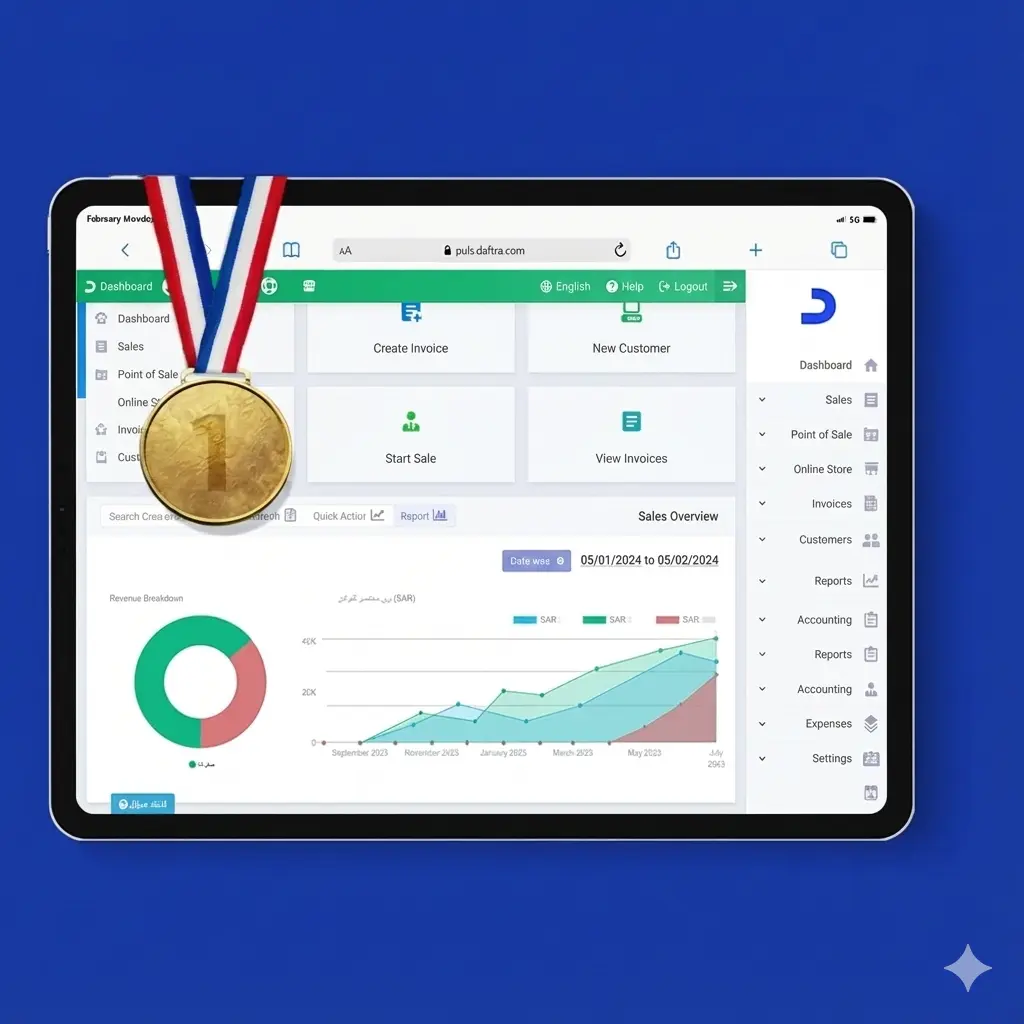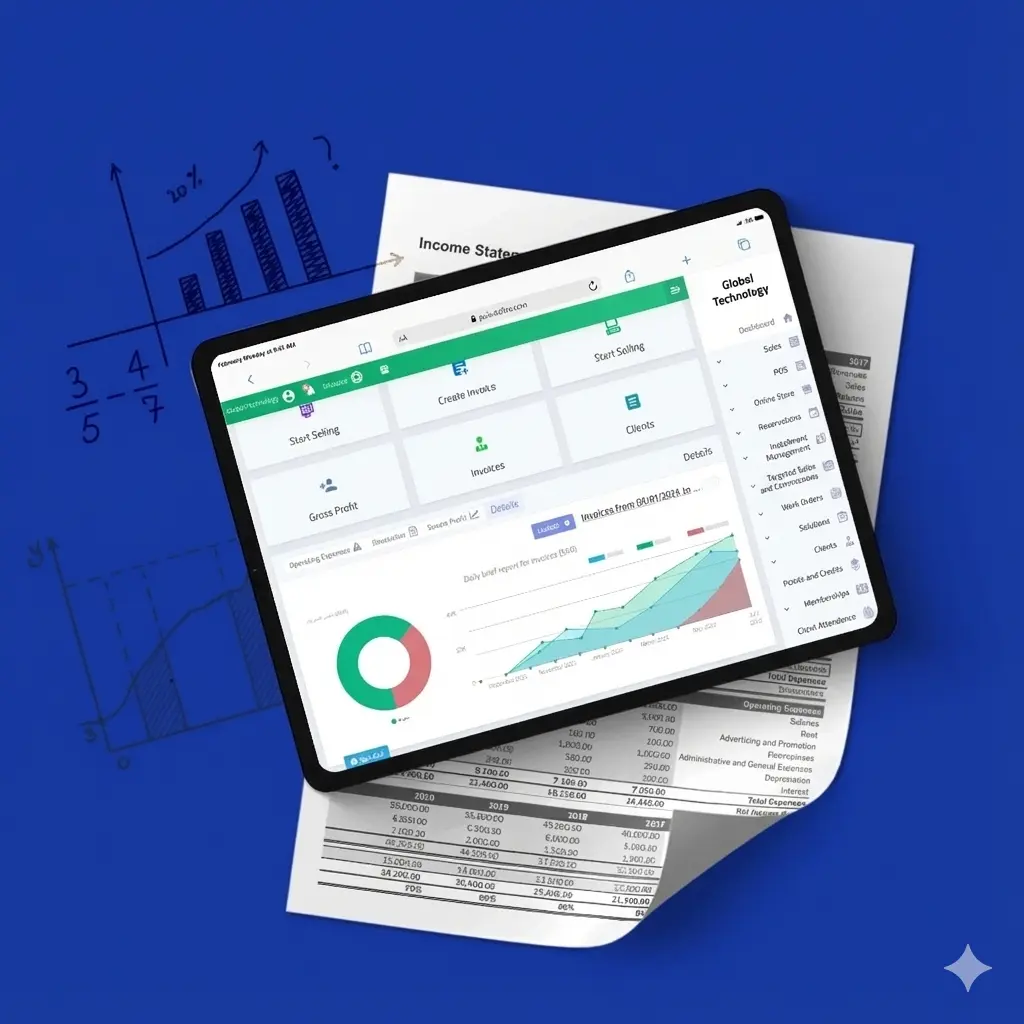What is accounting and its types - a comprehensive guide

Table of contents:
- What is the definition of accounting?
- What are the types of accounting?
- 1- Financial Accounting
- 2- Cost Accounting
- 3- Construction Accounting
- 4- Managerial Accounting
- 5- Corporate Accounting
- 6- Government Accounting
- 7- Tax Accounting
- 8- Legal Accounting
- 9- Islamic Accounting
- 10- Electronic Accounting
- 11- Cloud Accounting
- 12- Creative Accounting
- 13- International Accounting
- Frequently Asked Questions
Accounting is undoubtedly considered one of the most important aspects of business management and forms the backbone of many companies and institutions around the world. Some people's understanding of accounting might be simply recording numbers and preparing financial reports, but in reality, accounting's role extends to encompass many other aspects, such as financial planning, strategic decision-making, and providing crucial financial advice to both companies and individuals alike.
Accounting raises numerous questions and inquiries among business owners who are trying to understand how to manage the financial aspects of their companies.
What is the importance of accounting in the current era? What are the different types of accounting that they should have a thorough understanding of? And can we measure accounting's effectiveness and impact? In this article, we will delve deeper into the concept of accounting and its most important types.
Key Points
- Accounting is a fundamental process that includes recording, summarizing, and analyzing an entity's financial transactions.
- Accounting aims to provide useful financial information to internal and external stakeholders.
- Types of accounting are diverse and include financial accounting, cost accounting, managerial accounting, and various other types.
- Technology plays a significant role in accounting development, with specializations such as electronic accounting and cloud accounting emerging.
- Creative accounting focuses on using innovative accounting techniques to improve company performance while considering legal and ethical aspects.
- Financial accounting aims to prepare and present financial reports including balance sheets, income statements, and cash flow statements for shareholders and external investors, enhancing trust and facilitating investment decisions.
- Cost accounting focuses on analyzing production-related costs and providing detailed information to management for making effective decisions regarding pricing and cost management.
- Construction accounting enables contractors to efficiently track and manage project costs while providing accurate financial information to clients, regulatory bodies, and tax authorities.
- Providing accurate and detailed financial information enhances transparency and contributes to making strategic decisions with confidence and effectiveness.
- Managerial accounting aims to provide accounting information to managers within the organization to help them make effective decisions and plan for the future, focusing on reviewing the company's complete financial position and evaluating the impact of internal operations on spending and financial stability.
- Internal accounting for managers provides detailed reports on costs and revenues related to the organization's products and services, helping managers analyze profitability and make informed decisions.
- Decision support and making represents the role of management accountants in analyzing accounting data to provide advice and support to managers in making strategic and tactical decisions, ensuring data-driven decisions.
- Financial planning and analysis helps prepare budgets and financial forecasts and analyze actual results compared to planned budgets, assisting in future planning and identifying financial trends.
- Corporate accounting provides accurate information about the company's financial performance and ensures compliance with internationally or locally recognized accounting standards, enhancing transparency and confidence in financial data.
- Government accounting focuses on preparing financial reports, budgeting, and compliance with accounting laws and regulations, helping identify deviations and ensuring efficient and transparent use of public funds.
- Tax accounting includes preparing tax returns accurately and in compliance with tax laws, and guiding individuals and companies to determine effective tax strategies and comply with local and international laws.
- Legal accounting focuses on recording and analyzing financial transactions in accordance with local legislation and laws, ensuring compliance with international accounting standards and accurate preparation of financial reports.
- Islamic accounting relies on Islamic legal principles and rules in recording financial transactions, contributing to enhancing transparency and economic justice while achieving social responsibility.
- Electronic accounting relies on modern technology to perform accounting tasks accurately and effectively, facilitating the process and reducing costs.
- Cloud accounting uses cloud technologies to perform accounting operations electronically via the internet, providing accurate and fast information and facilitating decision-making.
- Creative accounting focuses on using creativity and innovation in preparing financial reports and managing financial affairs, enhancing efficiency and contributing to strategic decision-making.
- Forensic accounting includes analyzing financial information to detect fraud, embezzlement, and financial crimes, with focus on resolving disputes and ensuring regulatory compliance.
International accounting involves managing accounting operations across borders and compliance with international financial reporting standards, while facing cultural, linguistic, and multiple time zone challenges.
What is the definition of accounting?
Accounting is the process of recording, summarizing, and analyzing financial transactions and reporting them to relevant parties through recording, classifying, and preparing financial data such as balance sheets, income statements, and cash flow statements, which provides valuable information for making business decisions. The primary purpose of accounting is to provide useful financial information to various stakeholders such as management, investors, lenders, and regulators. Accounting's role involves measuring business performance and health by recording revenues, expenses, assets, liabilities, and equity. Providing financial information helps determine the company's profitability and financial solvency. Accounting essentially provides quantitative information of a financial nature about economic entities, intended to be useful in making economic decisions. Accounting is used to record many transactions such as:
- Evaluating payroll statements
- Monitoring or evaluating inventory levels
- Maximizing profitability
- Managing cash flow
- Analyzing business financial health
| Daftra Software helps you prepare financial reports and record and track daily financial transactions. It also contains programs for managing inventory, customers, and employees, along with many other programs. |
What are the types of accounting?
With the development of the economy, the complexities of companies, and changes in financial laws, accounting has evolved to include a wide range of different specializations and fields. This diversity provides multiple opportunities for accountants to explore and develop their preferred areas. Learn about the main types of accounting:
1- Financial Accounting
Financial accounting focuses on preparing financial statements and provides reports on the company's financial position and actual performance. It also provides financial information to external users, such as investors, banks, government employees, and shareholders. The main responsibilities of financial accounting include the following:
- Preparing the four main financial statements - income statement, balance sheet, cash flow statement, and shareholders' equity statement. These statements provide important information about revenues, expenses, assets, liabilities, and cash flow.
- Ensuring that financial statements comply with Generally Accepted Accounting Principles (GAAP), which are financial reporting standards and rules established by the Financial Accounting Standards Board (FASB). Adherence to generally accepted accounting principles adds credibility to financial statements, thereby enhancing investment confidence.
- Recording all economic transactions and events of the business. Financial accountants document transactions such as sales, expenses, asset acquisitions, loans, and equity investments.
- Providing reports to internal and external business stakeholders. Managers, investors, lenders, and regulators use financial statements, which also provide data on budgeting, investment, lending decisions, and performance evaluation.
- Providing information about past performance, focusing on recording and reporting historical transactions and performance. It reflects data that has already occurred for the company.
| You can prepare financial reports in the Daftra system with accuracy and comprehensiveness based on the data that is recorded in the system from the beginning of your use. The Daftra system ensures compliance with regulations, laws, and financial accounting standards. |
2- Cost Accounting
Cost accounting involves calculating, tracking, and analyzing costs associated with business activities. The purpose is to provide detailed cost information to help organizations budget, monitor costs, and make informed pricing decisions. In cost accounting, money is classified as an economic factor in production, while in financial accounting, money is considered a measure of the company's economic performance. Some key aspects of cost accounting include the following:
- Cost accumulation: This involves tracking all costs related to production, including direct labor, direct materials, and overhead (indirect costs such as rent and utilities). Costs are accumulated by function, process, product, or service.
- Cost analysis: Once costs are accumulated, cost accounting analyzes the data to determine where money is being spent, identify profitable and unprofitable areas, and highlight opportunities for cost reduction. Common analyses include variance analysis, cost-profit analysis, and inventory valuation.
- Budgeting: Cost accounting creates budgets to estimate future costs and set cost performance targets. Budgets allow organizations to monitor spending and adjust plans when actual costs differ significantly from budgeted amounts.
- Determining product and service costs: Detailed cost data enables companies to accurately estimate the cost of producing each product or service. This supports effective pricing strategies and decisions. The three key elements of cost accounting are as follows:
- Direct materials, which are materials used in final products, and indirect materials, which are materials used in production but cannot be linked to a specific final product.
- Direct labor is the costs associated with producing a product or providing a service.
- Overhead, which are ongoing business expenses that are not directly added to creating products or providing services. Rent, utilities, office staff wages, maintenance staff wages, supplies, equipment repairs, taxes, etc., are all considered overhead costs.
- Cost reporting: Cost accountants summarize their analyses in reports submitted to managers and executives. These reports convey cost data in ways that facilitate executive and strategic decision-making.
| Daftra contains a program for calculating and tracking expenses for companies. Register in the Daftra system and learn about all its programs now and enjoy a free 14-day trial. |
3- Construction Accounting
Construction accounting is a system specifically designed to help contractors track each job and how it affects the company as a whole. While it relies on the same basic principles of general accounting, it also involves several important and distinctive features as follows:
- Cost and estimate management: This aspect includes estimating project costs, tracking various costs such as material, labor, and equipment costs, and preparing financial reports related to costs.
- Billing and invoices: This process includes preparing invoices for clients, tracking due and received payments, and accurately recording them in accounting records.
- Cash and financing management: This process involves managing project cash flows, determining financing requirements, and providing relevant financial reports to concerned parties.
- Tax return preparation: This requires calculating taxes due on contractors' financial operations and submitting required tax returns to tax authorities.
- Inventory monitoring: This includes tracking and managing inventory of materials and equipment used in projects, and recording related movements in accounting records.
- Project and contract evaluation: This involves estimating the expected financial return from various projects and contracts and analyzing their profitability and financial suitability.
4- Managerial Accounting
Managerial accounting focuses on providing accounting information to managers within the organization to help them make decisions and plan for the future. Managerial accounting reviews the company's entire financial situation and evaluates how internal operations affect spending and financial stability. It also analyzes the company's business productivity, monitors its growth, and uses information in financial forecasting. Additionally, information in managerial accounting is designed for internal use, not external use. Managerial accounting is used in the following:
- Internal accounting for managers: Managerial accounting prepares detailed reports on costs and revenues related to the organization's products, services, operations, projects, and business units. These reports allow managers to analyze profitability, identify improvement opportunities, and make data-driven decisions. Common management reports include budget variance reports, product profitability analysis, and customer segment analysis.
- Decision support and making: Management accountants analyze accounting data to advise managers on decisions such as pricing, discontinuing unprofitable production lines, making make-versus-buy decisions, and capital investments. They provide insights into the financial implications of different options. Management accountants use techniques such as cost-volume-profit analysis and relevant cost estimation.
- Financial planning and analysis: Managerial accounting helps with budgeting, forecasting, and preparing financial plans. Accountants create budgets, then compare actual results to plans, conduct scenario analysis, and provide projections for future revenues, costs, and cash flows. It also helps managers with short-term and long-term financial planning.
5- Corporate Accounting
Corporate accounting enables companies to track their expenses, revenues, assets, and losses, in addition to monitoring numerous business and investment activities. This practice helps companies analyze and interpret their financial data by adopting internationally or locally recognized accounting standards. Through corporate accounting, consolidated statements, periodic statements, and tax reports are prepared, in addition to dealing with special events such as mergers and acquisitions and preparing consolidated budgets.
Corporate accounting plays a crucial role in business operations. Here are some of its key roles and functions:
- Reporting: Ensures accurate and timely preparation of financial statements, including income statements, balance sheets, and cash flow statements.
- Regulatory Compliance: Ensures compliance with various accounting standards, such as Generally Accepted Accounting Principles (GAAP) or International Financial Reporting Standards (IFRS), and legal and regulatory requirements. Adherence to these standards ensures transparency, consistency, and comparability in financial reporting.
- Budgeting and Planning: Responsible for creating budgets and financial plans that align with the company's strategic objectives. This means forecasting revenues, estimating expenses, and allocating resources to various departments or projects.
- Cost Management: Monitors and analyzes costs associated with production, operations, and other activities through implementing cost accounting techniques such as cost behavior analysis, variance analysis, and activity-based costing.
- Performance Evaluation: Provides key performance indicators and financial metrics to evaluate the company's performance. These metrics include profitability ratios, return on investment, liquidity ratios, and others.
- Analysis and Decision Support: Interprets financial data and provides insights to support the decision-making process. This includes analyzing investment opportunities, evaluating the financial feasibility of projects, assessing potential mergers or acquisitions, and conducting risk assessments.
- Internal Controls: Establishes and maintains internal controls to protect corporate assets, prevent fraud, and ensure the accuracy and reliability of financial information. Activities include developing and implementing control procedures, conducting internal audits, and evaluating the effectiveness of internal controls.
6- Government Accounting
Government accounting refers to the specialized accounting principles and standards used by government, state, and local entities. It focuses on budgeting, financial reporting, and meeting public sector compliance requirements. Government accounting relies on issuing periodic reports and monthly statements. Government accounting also helps identify deviations, correct course, and make appropriate decisions regarding accounting operations related to centrally funded government activities and services, to clarify the actual results of financial operations in government institutions.
Some key aspects of government accounting include the following:
- Applied according to accounting and financial reporting standards issued by the Government Accounting Standards Board, which provides guidance for government entities, unlike what the Financial Accounting Standards Board does for private companies.
- Preparing annual financial reports and operational statements that accurately reflect the government's financial position and activities. This includes funds, assets, liabilities, revenues, and expenses.
- Setting budgets at federal, state, and local levels that estimate spending and revenues for the upcoming fiscal year. Government budgets require legislative approval and are subject to audit.
- Tracking expenses across various government departments, agencies, and programs to ensure proper use of public funds. This supports financial accountability.
- Conducting extensive audit and compliance procedures by oversight agencies to verify appropriate use of taxpayer money and prevent resource mismanagement.
- Disclosing financial data and reports to provide transparency in government spending and operations to the public.
7- Tax Accounting
Tax accounting is the preparation of tax returns and ensuring compliance with tax laws and regulations, through providing financial and tax information accurately in accordance with legal requirements. Tax accounting includes several essential aspects, including:
- Helping individuals or companies determine appropriate tax strategies to minimize their tax obligations, whether through effective tax planning or taking advantage of available tax incentives.
- Focusing on accurately recording and documenting all financial transactions in accordance with applicable tax laws, including correctly calculating revenues and expenses to determine the net amount subject to taxation.
- Applying international accounting standards and local regulations related to taxes, with the aim of ensuring complete and accurate compliance with tax legislation and required financial reports.
- Providing consultations and guidance to clients regarding potential tax risks and appropriate way to avoid or deal with them effectively.
- Reviewing and analyzing financial and tax data to ensure their accuracy and completeness before submitting them to the relevant tax authorities, and actively dealing with any inquiries or additional requirements from them.
| The "Daftra" system helps you comply with the tax regulations and laws of your country, and also provides you with complete technical support at all times, along with a specialized team to serve you. |
8- Legal Accounting
The field of legal accounting encompasses recording, analyzing, and monitoring financial transactions for companies or individuals, with the aim of preparing accurate reports on accounting data and ensuring compliance with financial legislation and laws. Legal accounting also ensures compliance with international accounting regulations and standards in preparing financial statements and documents related to financial position, such as revenues, expenses, losses, profits, tax obligations, and others. The field of legal accounting is distinguished by its unique focus on analyzing financial transactions and using legal evidence and documents, in addition to numbers, to provide accurate estimates and reports that ensure compliance with legislation and laws. Legal accounting is fundamental to reducing the gap between investors and company management, as it provides reliable reports that reflect the company's true financial position, thereby increasing investor confidence and contributing to increased investments. With the presence of legal accounting, focus is placed on analyzing the company's historical financial facts and using legal evidence and documents, providing a comprehensive view of accounting issues that goes beyond numerical aspects.
9- Islamic Accounting
Islamic accounting is a set of accounting processes that are implemented according to Islamic legal rules and principles, with the aim of providing necessary information and using it effectively by relevant parties to organize the work of financial institutions and achieve societal interests. Islamic accounting is considered an important branch of accounting that is distinguished by applying Islamic legal principles and rules in recording and analyzing financial transactions, seeking to achieve equality, economic justice, and social responsibility. Islamic accounting relies on Islamic legal rules and principles in all aspects of financial recording and reporting, such as avoiding usury, speculation, and unlawful financial risks. Islamic accounting seeks to achieve compliance with Islamic Sharia rulings in financial and commercial transactions. Among the fundamental objectives of Islamic accounting are:
- Compliance of individuals and institutions with Islamic Sharia principles in financial transactions.
- Full disclosure of financial information to ensure transparency of accounting data and achieve justice in the distribution of profits and losses.
- Enhancing trust and integrity of the Islamic financial system and improving financial literacy.
- Controlling financial crimes through careful examination and documentation of financial transactions and ensuring their compliance with Islamic Sharia rulings.
- Improving work ethics in the field of accounting through adherence to Islamic wisdom and clear distinction between what is permissible (halal) and forbidden (haram).
10- Electronic Accounting
Electronic accounting refers to performing accounting tasks using modern technology, which facilitates the process and reduces effort and cost. This includes using accounting software and electronic devices to execute accounting operations with accuracy and efficiency. Fundamentally, electronic accounting combines traditional accounting principles with digital technology, and aims to improve financial performance and sound decision-making for companies and institutions. Through electronic accounting programs, financial data is recorded and analyzed quickly, enabling companies to deal with financial challenges more efficiently. Among the advantages of electronic accounting:
- Electronic accounting is considered essential for achieving transparency and accuracy in financial reports.
- It facilitates collaboration between different departments within the organization.
- It contributes to eliminating traditional accounting processes and improving work efficiency.
- Electronic accounting is of utmost importance for compliance with financial legislation and laws.
- It provides reliable data for financial disclosure purposes and tax reports.
11- Cloud Accounting
Cloud accounting is an accounting system that relies on cloud technologies to execute accounting operations electronically via the internet, instead of depending on traditional solutions such as paper ledgers and records. The importance of cloud accounting lies in providing accurate and fast accounting information, which can be used to create financial reports and future forecasts, manage costs and payments and entries, and other accounting activities. Cloud accounting is quite similar to electronic accounting, as both refer to using modern technology in accounting operations and financial management. However, cloud accounting can be distinguished by its reliance on cloud storage for data and information, which means not depending on local device storage capacity, but rather storing data through cloud servers via the internet. Among the importance of cloud accounting are the following:
- Speed in dealing with accounting data and information.
- Saving effort and cost and increasing productivity and profitability.
- Reduced costs related to using cloud accounting.
- Speed in decision-making and maintaining information confidentiality.
- Reviewing and monitoring accounting work in a visual and organized manner.
12- Creative Accounting
Creative accounting is the manipulation of actual figures in a company's financial statements and reports, carried out by accountants within the company either to achieve personal interests or by order of management with the aim of obtaining fictitious profits or unreal achievements and a false financial position. Accounting data is manipulated by exploiting certain loopholes in accounting principles and standards. This manipulation primarily aims to beautify the company's image and maximize its profitability results and financial position in a way that is completely detached from reality to achieve the goals it seeks, and to mislead the company's position to investors and external parties. Among the reasons for the emergence of creative accounting, creative accounting began to appear during the recession period in the 1980s, when companies found difficulties in operating and achieving profits. Companies that were on the verge of collapse resorted to fabricating these profits and falsifying their published financial reports to attract investments and achieve actual profits through that. The motives of these companies for resorting to the use of creative accounting have varied.
13- International Accounting
International accounting encompasses managing accounting operations across borders and multiple currencies. As companies expand globally, accounting teams face the challenge of consolidation and reporting across different countries, regulations, currencies, and accounting standards. Some key aspects of international accounting include the following:
- Managing cross-border accounting: Coordinating financial reports and operations globally requires strong organizational skills. The accounting department must track financial data and maintain internal controls for international subsidiaries and foreign branches, which involves additional complexity for transactions, translations, and consolidations.
- Compliance with International Financial Reporting Standards: Publicly traded companies must comply with International Financial Reporting Standards (IFRS), which differ from generally accepted accounting principles specific to each country, such as US GAAP. Adopting IFRS requires changes in accounting policies, procedures, systems, and training.
- Global accounting challenges: Language barriers, cultural differences, multiple time zones, and distance can make global accounting difficult. Additionally, foreign exchange rate volatility creates problems in currency conversion in financial reports, and transfer pricing and tax minimization strategies add complexity.
In conclusion, we find that accounting is a fundamental and vital process in business management and ensuring its continuity and success. Accounting varies according to the needs and nature of each organization, encompassing financial accounting that focuses on preparing financial reports and cost accounting that is concerned with cost analysis and determining production costs. For its part, management accounting relies on providing accounting information to support administrative decision-making processes, while tax accounting aims to meet the tax obligations imposed on institutions. With technological development, new fields in accounting have emerged such as electronic accounting and creative accounting, which aim to provide innovative and accurate solutions to modern accounting challenges. Ultimately, accounting remains a fundamental tool for financial control and strategic decision-making, and every organization must choose the appropriate type of accounting and adopt best practices to ensure achieving its goals and success in the market.
Frequently Asked Questions
What is the purpose of accounting?
The goal of accounting is to determine the result of a company's activity for each time period, by determining whether the company achieved profit or loss. In addition to providing the necessary financial data for making decisions related to developing the company and improving its operations.
What are the types of expenses in accounting?
- Operating expenses
- Capital expenses
- Non-operating expenses
- Purchase expenses
- Administrative and general expenses
- Financial and financing expenses
- Establishment expenses
- Accrued expenses
- Fixed expenses
- Variable expenses
What are the benefits of accounting?
The benefit of accounting is providing financial information that decision-makers can analyze and use to make improvement and development decisions to achieve profit, organize financial transactions, and comply with regulations and laws.
What is the journal book in accounting?
The journal book in accounting is a financial record that shows all daily financial transactions and includes debit side, credit side, value, and date.
What is the difference between the accounting department and the finance department?
The accounting department focuses on recording financial transactions, preparing reports and analyzing them, while the finance department focuses on managing assets and liabilities and making decisions based on results derived from reports.
What is a worksheet in accounting?
A worksheet in accounting is a tool used to facilitate the preparation of financial statements, and one of the most famous examples is the journal book.
















